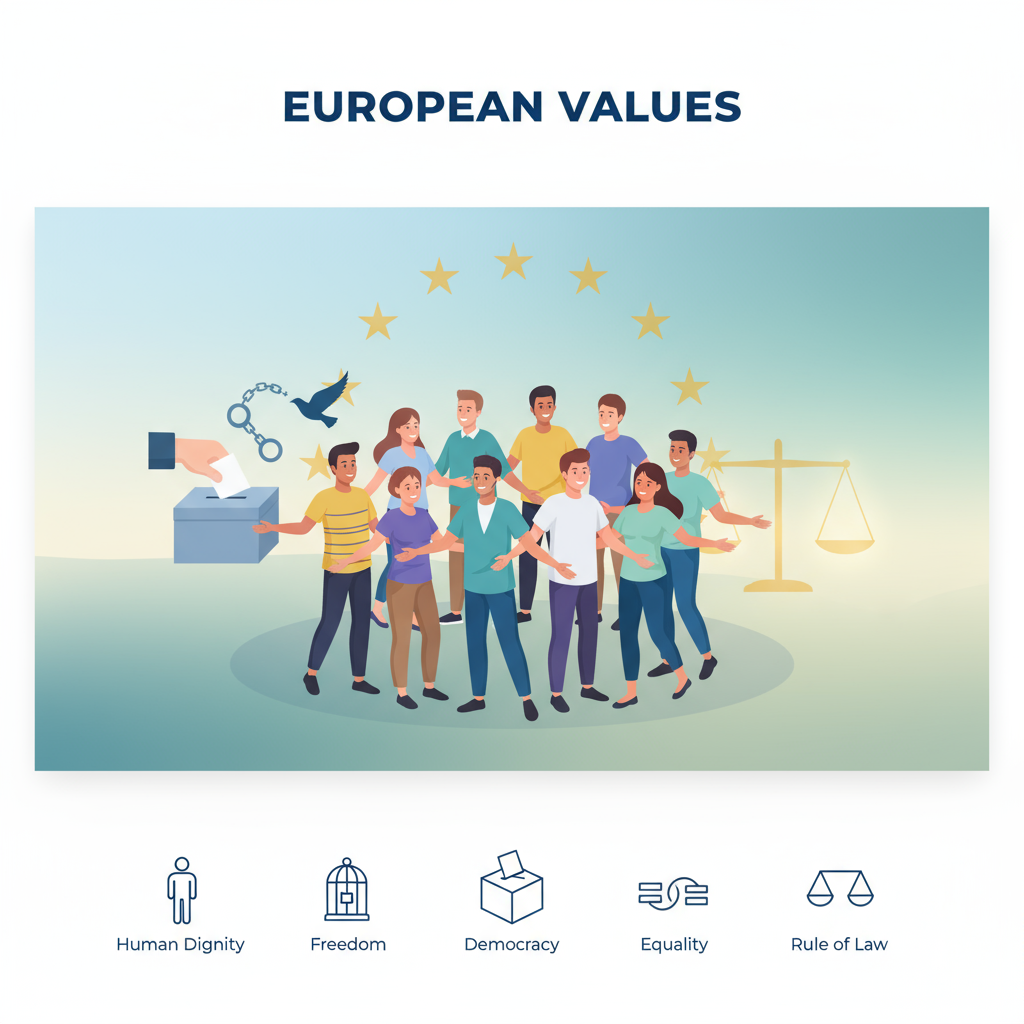
The European Union is built upon a foundation of shared values that guide its policies and actions, both internally and on the global stage. These values are not merely abstract concepts; they are the bedrock of European society, shaping the daily lives of its citizens and defining its collective identity. Understanding these fundamental values is crucial for any European, especially young adults, to fully grasp the essence of their European identity and the significance of the EU’s role in the world. This article will take you on a visual journey through the five core values that underpin the European Union, exploring their meaning and impact.
1. Human Dignity
Human dignity is the inviolable core of fundamental rights. It is the foundation of all other rights and is enshrined in Article 1 of the Charter of Fundamental Rights of the European Union. This value recognizes the inherent worth of every individual, regardless of their background, beliefs, or circumstances. It demands that all people be treated with respect and that their physical and moral integrity be protected. In practice, this means upholding the right to life, prohibiting torture and inhuman or degrading treatment, and ensuring the protection of personal data. The EU strives to create a society where every person can live a life of dignity and respect.
2. Freedom
Freedom is a multifaceted value that encompasses various aspects of individual liberty. It includes the freedom of movement, allowing EU citizens to live, work, study, and retire in any Member State. This freedom is a cornerstone of European integration, fostering cultural exchange and economic opportunity. Beyond physical movement, freedom also extends to freedom of thought, conscience, and religion, freedom of expression and information, and freedom of assembly and association. The EU safeguards these freedoms, recognizing them as essential for a vibrant and democratic society. It ensures that individuals can express themselves freely, participate in public life, and pursue their beliefs without fear of persecution.
3. Democracy
Democracy is a core principle of the European Union, ensuring that its citizens have a direct say in its governance. The EU operates on the principle of representative democracy, where citizens are directly represented at the Union level in the European Parliament. Every five years, European citizens elect their representatives to the European Parliament, who then play a crucial role in shaping EU legislation and policies. This democratic process ensures accountability and transparency in decision-making, allowing citizens to hold their elected officials responsible. The EU actively promotes democratic values not only within its borders but also globally, supporting democratic transitions and institutions worldwide.
4. Equality
Equality is a fundamental value that demands equal treatment for all individuals, without discrimination based on sex, racial or ethnic origin, religion or belief, disability, age, or sexual orientation. The EU is committed to combating discrimination and promoting equality in all its forms. This includes equal pay for equal work, equal opportunities in employment and education, and equal access to goods and services. The EU has implemented various directives and policies to ensure that all citizens have the same rights and opportunities, fostering a more inclusive and just society. The principle of equality is central to building a Union where everyone can thrive and contribute to society.
5. Rule of Law
The rule of law is a cornerstone of the European Union, ensuring that all actions of the EU and its Member States are based on laws and not on arbitrary decisions. It means that all public authorities act within the limits of the law, that citizens can challenge the actions of public authorities in independent courts, and that everyone is equal before the law. The EU’s legal system is based on treaties that are voluntarily and democratically agreed upon by all Member States. The European Court of Justice ensures that EU law is interpreted and applied uniformly across the Union, upholding the principles of justice and legal certainty. The rule of law provides stability, predictability, and protection for citizens and businesses within the EU.
These five fundamental values, human dignity, freedom, democracy, equality, and the rule of law, are not just ideals; they are living principles that guide the European Union’s journey towards a more integrated, prosperous, and just future. They represent a shared commitment to human rights, democratic governance, and social justice, forming the very identity of what it means to be European. By understanding and upholding these values, young Europeans can actively participate in shaping the future of their Union and contribute to a world that respects and promotes these universal principles.
